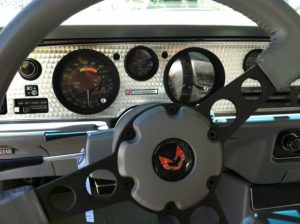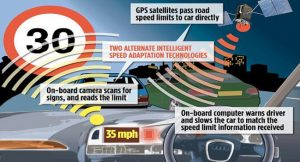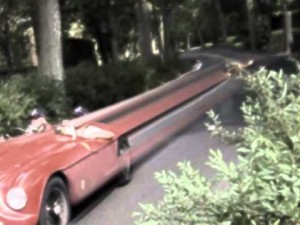I don’t have to worry about what is styled my “data” – that is, information about me, what I’m doing, where I’m going, where I’ve been, etc. – being “compromised” when I drive my analog vehicles. That is to say, vehicles made when vehicles were still autonomous. Which is to say, independent of external monitoring and control.
Such vehicles do not collect “data,” in the first place. And they aren’t capable of “sharing” – loathsome word in the context of the modern usage of that word, which invariably means being forced to “share” whatever it is – with anyone or anything else.
What goes on between my analog car and I is strictly between us. It is one of the reasons why I – and most Americans – once upon a time liked our cars. They gave us freedom – in more than just the obvious way, that of going wherever we liked, whenever we liked. There was also the freedom of no one else knowing about anything of that. A road trip was appealing because it was an adventure. Our cars gave us control; they were not vehicles of control.
But that is exactly what they are becoming.
It is what all of them – that are new – already are.
“Data” about us is collected by them every time we go for a drive – and this “data” is accessible by others. Who those others are is essentially open-ended in that it can be anyone – or anything – that has access to the “data.” You have essentially nil control over that. Nor over the acquisition of “data” – information! – about you.
The modern car is for this reason not autonomous – another word that, in modern-speak, now means something very different than what it used to mean (like “gay,” for another instance).
It is connected.
All new cars have modems and Wi-Fi. They receive – and they transmit. This entails the possibility of much more than obtaining information about you. Information that – at least potentially – can and probably will be used against you. As for example information about how fast you’re driving – and whether you’ve just ignored a traffic law.
I was “speeding” the other day in one of the new cars I test drive, which – unlike my analog cars – knows just exactly how fast I am going at any given time and whether I am going faster than the law says I may.
Italics for a reason.
An analog car such as my ’76 Pontiac Trans-Am has a speedometer that indicates how fast I am going.
Also in italics for a reason. That being to accentuate the difference between knowing – and indicating. A new car – any of them, all of them – literally knows how fast you are going. It also knows whether you are going faster than the sign by the side of the road says you may. Just one of several such things all new cars know. Just one of several such things than can be known by others, which would include anyone who has access to the “data.”
That would include the manufacturer of the vehicle – just the same as the manufacturer of the company that you bought your “smart” phone from. (And it is very smart, indeed, to trick stupid people into voluntarily handing over their “data” to nebulous and nefarious corporations that operate as minions of the government; or is it the reverse?) This data can be shared – there’s that word, again – with whomever the corporation decides to share it with.
Whether you approve or not. Hell, they don’t even ask.
Such sharing includes the way the insurance mafia shares with the government whether you’ve bought the “coverage” the government forces you to buy at the behest of the insurance mafia. If you haven’t bought it, the government will know about – almost as soon as you didn’t.
Similar sharing – with the mafia and the government – is all-but-certain to happen as regards your “speeding” and other such things. Including the size of your “carbon footprint” at the moment. If you’ve driven farther than they say you’re allowed to – and by doing so, caused “excessive” carbon dioxide to be “emitted”- they will know.
And they will be able to do something about it.
A not-autonomous, “connected” car can be disconnected. It’s as easy as transmitting the necessary “update.” All of this can be automated, according to programming. The data determining the parameters.
Analog cars are immune from all of this. In order to control them, it is necessary to physically control them. It is not possible to remotely control them. No one can “brick” my old Trans-Am (or any car its age) without actually bricking it, as by puncturing the tires or putting silica in the engine.
It keeps my secrets. It does not share my “data.” And that is why I still have it – and love it. For it reminds me of that better, vanished time Rush mourned in the song, Red Barchetta.
Mine may be orange. But that’s beside the point.
They can’t control it. Or – by dint of that – me.
You might want to get one for yourself. Before you no longer can.
. . .
If you like what you’ve found here please consider supporting EPautos.
We depend on you to keep the wheels turning!
Our donate button is here.
If you prefer not to use PayPal, our mailing address is:
EPautos
721 Hummingbird Lane SE
Copper Hill, VA 24079
PS: Get an EPautos magnet or sticker or coaster in return for a $20 or more one-time donation or a $10 or more monthly recurring donation. (Please be sure to tell us you want a magnet or sticker or coaster – and also, provide an address, so we know where to mail the thing!)
If you like items like the Keeeeeeeeev! t shirt pictured below, you can find that and more at the EPautos store!












Several years ago Scott Walker ran for governor of Wisconsin on a few different platforms. A few being the elimination of both the indoor smoking laws as well as the mandatory car insurance laws, both of which were brand in the state at the time of his victory. Well, after he won, not a peep about either law. Color me shocked, shocked I yell you!
Hi Logan,
Republicans can be counted on to talk about “less government” – and then amen more of it.
What gets me about health insurance, the coverage bought and paid for but some health issues are not covered completely, as soon as somebody young or old who becomes ill, diseased, a serious health problem such as a malignant neoplasm, there is always a fund raiser to defray medical costs.
Maybe the ill person has no health insurance, the parents have limited coverage, the health care charges still should be covered by the health insurance companies.
What should stick in your craw is CEO’s make millions in income, exorbitant salaries while suffering and financial armegeddon for those involved with medical issues is what can happen.
The rich get richer, the poor get hell. One helluva note to be told what to do all of the time, sucks.
Get your mask on!
It’s the real world, not much of a paradise, is it?
Amen, Drump –
What you’ve written is why I shun “coverage.” You pay – until you attempt to use the “coverage” – at which point, they start making you pay even more. Excepting catastrophic situations, most people are better off, I think, just saving the money and living prudently.
Exactly! Insurance might as well just be another tax, ESPECIALLY when it’s compulsory.
Hi Bluegray,
I keyed into the “coverage” scam a long time ago. Especially as regards “health” “coverage.” I’ve told this one before, but it’s perpetually relevant:
When I got my first salaried job as a writer for The Washington Times back in the early ’90s, I was offered “coverage” for my “health.” Thankfully, this was still optional in those better, vanished times. I opted to not waste a big chunk out of my pay each month to be “covered” – because what the Hell does a fit young guy in his 20s need to be “covered” for? This saved me many thousands of dollars, which went toward the downpayment on my first house. Today, it’s much harder for a young guy in his 20s to come up with a down payment for his first house . . . in part because of all the “coverage” he is forced to buy.
I wish more younger people understood this. They’d be less on the Lefty side of the aisle if they did.
Sharing your “data” can be deadly, just ask Michael Hastings, who is now dead, because he was driving a car that could be remotely hacked.
Hastings was a critic of Obama and Hillary was working on a story of a lifetime, and said just before his death he was not suicidal. Like Martin Luther King, he knew his time was up.
—————-
wiki – “On June 18, 2013, Hastings died in a single-vehicle automobile crash in his Mercedes-Benz C250 Coupé at approximately 4:25 a.m. in the Hancock Park neighborhood of Los Angeles.[58] A witness to the crash said the car seemed to be traveling at maximum speed and was creating sparks and flames before it fishtailed and crashed into a palm tree.[59][60] Video from a nearby security camera reportedly shows Hastings’s vehicle speeding and bursting into flames.[61]
Witnesses described the car’s engine being ejected 50 to 60 yards (46–55 m) from the scene.[60][62] Hastings’s body was burned beyond recognition. The coroner identified the body by matching fingerprints with those the FBI had on file.[63][64] Two days after the crash, the Los Angeles Police Department declared that there were no signs of foul play.[65]”
————–
It is obvious to any conspiracy theorist that Michael Hastings was assassinated to stop his story about political corruption, it was so obvious in fact that Forbes magazine got the identical car and put some computer jocks in the back seat to see if it could be hacked, and indeed it could easily be hacked by mere touch of a laptop keypad.
The lack of evidence of foul play is exactly why such cars are built. The idea is to assassinate the dissenter without any fingerprint, and if you have more than a few neurons working, you would immediately speculate that the push for EV’s and cars with WIFI is for the very purpose of political control.
During recent heat waves in CA and TX, Tesla cars WIFIed to the mainframe told the owners not to charge, or prevented them from doing so. Obviously if the authorities have that level of control, they could limit your charge or eliminate it altogether if they wanted, say your social score dropped because you voiced the incorrect opinion over a social media app. And if they can control the charge, surely they can control the steering wheel and brakes and motor juice.
So if you are in a brand new deluxe edition EV and all of a sudden the car accelerates to ludicrous speed, and the brakes fail, and the doors locked, you have a few moments to reflect on how you offended the tech gods at Department of WEF compliance unit.
—————-
“WikiLeaks ‘Vault 7’ dump reignites conspiracy theories surrounding death of Michael Hastings”
“NOT only can the CIA hack your iPhone, Android or smart TV, they can also carry out “nearly undetectable assassinations”.”
WikiLeaks’ release on Tuesday of a massive trove of secret CIA documents has reignited conspiracy theories which have swirled since 2013, with revelations the spy agency was attempting to remotely hack vehicles.
“As of October 2014 the CIA was also looking at infecting the vehicle control systems used by modern cars and trucks,” WikiLeaks writes. “The purpose of such control is not specified, but it would permit the CIA to engage in nearly undetectable assassinations.”
Hastings, an acclaimed war correspondent and vocal critic of government mass surveillance, died in the early hours of Tuesday, June 18, 2013, when his Mercedes C250 Coupe apparently lost control and burst into flames before slamming into a palm tree.”
—————
This remote hacking of a vehicle is nothing new, because Jimmy Carter secretly authorized passenger jets manufacturers to install avionic software that could be remotely hacked to take aircraft control away from hijackers. But little did anyone realize that such a feature could be used by the Zionists/CIA to remotely fly jets into Trade Towers for a dramatic false flag so that the military industrial state could give itself permission to wage a War of Terror on the world.
And so what if the passengers get incinerated or the people in the towers burned alive, it was well worth it. And who cares about the Goyim when money is to be made. That my friends is exactly why you should suspect Joe Biden and the CIA behind the LAHAINA HOLOCAUST.
https://www.thedrive.com/the-war-zone/42673/the-ac-130j-gunships-first-solid-state-laser-weapon-has-arrived-for-testing
The DOD and USAF now have a laser cannon on an AC-130J aircraft specifically design to fry electrical transformers. Go look it up.
You can have a fully “analog” ride like a VW “Kafer” (Beetle) or a vintage Plymouth Valiant (Slant Six, three on the tree). He’ll, even a stripped down Plymouth Satellite will do. Not hard to wrench them, parts still plentiful and affordable… NOW.
All these “Boomermobiles” would be threatened mostly by legislation or bureaucracy. That is, your otherwise useful ride is not allowed on the “Pube-Lick” roads, citing S-a-a-a’a-f-t-e-e-e or the “Environment “.
I’m sure Sirius is reporting back to whoever at FedGov how much I access 114 (Fux), 125 (“Pate-tree-ut”), or even BYU (143). Eff em. I’ll listen to what I damned well please. Even Chairman’s Hour on 70 (Sinatra) All going to that data center in Herriman, Utah.
You mean this one? https://goo.gl/maps/iBBD2V1BNEDQHgxQ9
Google assigns its zip code to be Saratoga Springs. It sits directly across from Camp Williams along Redwood Road (Camp Williams has its main address in Bluffdale). Its entrance road is numbered as if it were in Lehi. The facility itself is barely located within Bluffdale’s city limits, just outside of both Lehi and Saratoga Springs. The entrance road is in a tiny unincorporated slice of Utah County just south of the county’s border with Salt Lake County. I’m sure the location ambiguity is on purpose.
The facility is ringed by two perimeter roads, one on either side of a big perimeter fence with razor wire. A UHP officer is always stationed about 1/8 mile up the entrance road, just waiting to pull someone over that isn’t cleared to approach. On aerial photos, it looks like an elongated bullseye in the foothills. I’m sure it’s a priority target for nuking if things go hot.
I used to work near there and have driven past on Redwood Road hundreds of times. I’m glad I no longer have reason to go anywhere near there. That place gives me the creeps.
Every Rolls Royce jet engine has computerized telemetry to track each jet engine anywhere on the planet. EHM, engine health maintenance. Rolls Royce knows where all 4000 jet engines are at any time of day or night.
You can rfid everybody to track them anywhere they are or go. Just dig the thing out from under your skin, don’t need no stinkin’ ear tag.
Computer telemetry in automobiles is superfluous, but necessary.
Speaking of data gathering, I saw the following two news stories *right before* seeing Eric’s article on analog cars.
New Jersey partnered with a private data gathering firm to combine plate reader videos, location of recording the plates, and AI to search for patterns to charge people with “crimes.” https://www.forbes.com/sites/thomasbrewster/2023/07/17/license-plate-reader-ai-criminal/?sh=5494ef753ccc and https://www.schneier.com/blog/archives/2023/08/applying-ai-to-license-plate-surveillance.html
And this little gem from the TwitHeads: JSOC analysts targeted 100,000 or more Iraqis for death without ever understanding a word of Arabic using cellular network data and guesswork https://twitter.com/sethharpesq/status/1693735689391604204 . Rumor says that many of these former JSOC analysts are now working for FBI/CIA/NSA/DHS to identify “domestic extremists.”
Eric – “No one can “brick” my old Trans-Am (or any car its age) without actually bricking it, as by puncturing the tires or putting silica in the engine.”
Funny that you mentioned puncturing the tires on your analog Trans Am. This morning my friend (who’s really into guns) went out to his Ford Explorer Sport and, while loading it up for work, he discovered a nearly two inch fishhook-looking spike in his passenger rear tire. He sent me a picture. What I saw was clearly meant to puncture the tire and make it go flat requiring replacement. My first thought was it was someone who didn’t like his CCDL (Connecticut Citizens Defense League, a gun rights organization) sticker on his truck. But then I remembered about the “Climate Deflators”, a group of insane nutjobs who go around deflating the tires on SUVs, mainly expensive ones in cities because they’re “bad for the environment.”. They think by puncturing the tires on your Chevy Suburban or Lincoln Navigator they are crusaders saving the planet. They started in Britain and now they’re here in America. I’m wondering if some lunatic inspired by these terrorists may have placed the spike in his tire, hoping he would roll over it forcing him to buy a replacement Falken Wildpeak.
UPDATE: Apparently my friend wasn’t as lucky as I thought…the spike did puncture his tire. A local Firestone was able to put a plug in and save the tire, though. For $22.
Hi Bill,
Yes, I have heard about this. Well, game on. Anyone who tries this can expect – and deserves – a beat down.
A PERMANENT attitude “adjustment”, courtesy of the firm of Smith and Wesson – .40 caliber and UP!
The biggest problem is with the software. You don’t own it, no matter how much you paid for it. You can only “license” it. There that word is again, “license”.
So that means they can take that license, for about any reason, or even no reason. (have you ever read the software use “agreement”?) Spying aside, what about this? So what happens if they go out of business or just decide to stop supporting old software and turn it off? Then you have a very heavy paperweight. All these things need software to work.
At least with most 1990’s cars, they can’t get the data from you over the air. They have to obtain the black box or whatever, so if you can keep that away from them you at least don’t lose the data.
A third party software replacement (you would have to replace it all) industry needs to develop. Reverse engineering is a big job. You can’t just install extra software to destroy or block data, as that would violate the “user agreement”.
Farmers running John Deere equipment know all about that.
I was thinking of getting a new made in Japan vehicle, but all the safety crap on it that can’t be permanently turned off has me leaning to just keeping my 2014 Mazda 3. I’ve not found any business that can turn off all that crap, sadly. I’d think there would be a demand for such, but I guess the sheeple population is too large now.
It’s more likely that legal businesses don’t want to deal with the “civil administrative actions” that would be brought against them by some 3-letter agency. Now, if these cars were in demand for transformation into cars used specifically in off-highway motorsports, there would be a ton of options, but all of them would have a prominent disclaimer about how, if they modify your car, you can no longer legally use the car on the roads. I also believe that there might be underground “businesses” that will do exactly what you want but you have to have the cash (literally) and you have to know someone who knows someone.
I daily a 96 subaru Impreza…Its got efi and a/c that`s about it..No “Help” of any kind….Not even Abs. And three pedals..Suck it big tech.
A suggestion: Within these articles it might be helpful to also offer solutions to the issues you raise. I see people starting to do so in the comments, yet as an expert you have a terrific opportunity to recommend new or used cars still available for interested readers. I’m leaning toward driving to Florida to pick up a 15-yo Cadillac and stopping at a recommended Northstar Performance shop in Tennessee on the way home. I’d prefer a ’68 Impala, but rich people have made collectables out of everything good (another good subject for your writing).
An aside: GM is offering a couple of newfangled Korean cars in the $25k range, the new Trax/Envision pair. Would love to hear your take.
A great idea, Scooter!
Consider it in the works!
If you are heading through Nashville or Gatlinberg area, stop and visit Cooter’s Place on the way home.
So much political incorrectness.
Eric, Bless You. I have a 1982 Fiat 2000 Spider. It is my favorite car: a great cluster of analog gages, simple to work on, ample parts availability, smooth shifts, great road holding. Great styling and a joy to drive. Best of all, none of the new car safety features that make driving unsafe.
Thanks, Albert!
We speak a common language here. In doing so, we assure one another we’re not the only ones who still speak it!
The Fiat 2000 Spider, is a car I always wanted. I am looking on bringatrailer for one and close enough that I can see it in person… and they are not crazy expensive right now. I think we have to take the British approach to cars. I remember when I was a kind with my parents on vacation in England and I asked why all rich people had old cars and got this very terse reply, “sir, they have their cars”
Three main vehicular spies:
‘In the last 18 months CBP and ICE officials demanded location data from three companies who collectively track the movements of tens of millions of vehicles every day: GM OnStar, Geotab and Spireon.
‘Canadian company Geotab provides commercial fleet management tools that are typically plugged into a vehicle’s port and it claims to process “over 40 billion records a day … from millions of connected vehicles, forming the richest telematics data set in the world consisting of engine data, GPS data, accelerometer data and more.” That huge data set has been boosted by recent partnerships with GM and Ford.
‘Spireon, based in Knoxville, Tennessee, was called on to provide three months of location data from April 2020 to July 2020 for a Volkswagen CC that had one of the company’s GPS trackers on board, as well as methamphetamine and heroin.
‘Forbes also revealed a case where Sirius XM, the $25 billion broadcasting and in-car infotainment provider and GM partner, was asked to “activate and monitor as a tracking device the Sirius XM Satellite Radio” installed on a vehicle for ten days.’
https://tinyurl.com/bdz4dncm
Auto makers: Enemies of the People.
I’m sure Sirius is reporting back to whoever at FedGov how much I access 114 (Fux), 125 (“Pate-tree-ut”), or even BYU (143). Eff em. I’ll listen to what I damned well please. Even Chairman’s Hour on 70 (Sinatra) All going to that data center in Herriman, Utah.
‘What goes on between my analog car and [me] is strictly between us.’ — eric
‘A surveillance contractor called Ulysses can “remotely geolocate vehicles in nearly every country except for North Korea and Cuba on a near real-time basis,” Vice Motherboard reports.
‘Ulysses obtains vehicle telematics data from embedded sensors and communications sensors that can transmit information such as seatbelt status, engine temperature, and current vehicle location back to automakers or other parties.
“Among the thousands of other data points, vehicle location data is transmitted on a constant and near real-time basis while the vehicle is operating,” the company wrote in a sales pitch document obtained by Vice. As roughly 100 million new cars are manufactured worldwide each year that are “increasingly connected to the manufacturer, other vehicles, infrastructure, and their owners, it becomes apparent that telematics will revolutionize intelligence,” the document adds.
‘Ulysses claims it can currently access more than 15 billion vehicle locations around the world every month, and it estimates that by 2025, 100 percent of new cars will be connected and transmitting gigabytes of collectible data per hour.’
https://tinyurl.com/mt5p8cuc
It’s rather surprising that a sharper distinction isn’t made between contemporary ‘connected’ spymobiles and off-grid vintage vehicles. Since the surveillance is invisible, apparently the surveillees don’t care.
Still, I sleep better knowing that my vintage vehicles don’t and can’t rat me out to the stinking narcs … though LPRs still do when I go to bigger towns.
We found reasonably priced car insurance for $917 a year in a state (Michigan) where car insurance is usually expensive. Yesterday we decided to refuse to download a monitor app into a smart phone to monitor driving speeds and hard stops. That will cost us $77 more for the year. The wife and I decided we did not want to be monitored (never have been before this year) and decided to pay the price (a lost insurance discount). I would buy car insurance even if it was not mandatory, although I have never made a claim in 50 years of driving.
Richard,
It’s a measure of the times that you would describe paying almost $1,000 for nothing – literally – as “reasonable.”
Over the course of five years, you will have spent around $5,000 for nothing. That’s not nothing to most people. It used to be enough to buy – outright – a very solid used car.
Coverage is a major contributing factor to why most people are broke. Add it up – car, home, health and life – and most people are working to pay for coverage.
How did society become this neurotic?
Hey Eric,
I think society became neurotic and hostage to the insurance mafia with the proliferation of lawyers. Next to drug companies the most ads on the tv these days are for law firms; anyone of us is one lawsuit away from bankruptcy, which provides the incentive for insurance. Some dumbass “slips and falls” on your property or has an accident and their first call is to a lawyer, hoping they’ve just won the lottery. I carry extra liability insurance on my property solely for that reason, and hope I never have to use it.
Although if he totals a $40,000 car the insurance will replace it. That means even if he had paid $1000 a year it would take 40 years to equal that. So in worst case scenario you come out way ahead. It’s a gamble so you should do whatever you feel comfortable with. If someone wants the peace of mind insurance provides I wouldn’t criticize them as I have known many people who were VERY glad they were covered in an accident.
Hi Easy,
But I do not live my life assuming the worst case scenario. Most “accidents” are avoidable. If people want to buy “coverage” to ease their fears, that is fine with me. My objection is to being forced to pay for that which I have concluded I do not need or which would be a bad deal for me.
It’s worth mentioning here that as recently as 50 years ago, most “coverage” was optional and many chose to do without. Today, much of it is mandatory – and very expensive as a result. 50 years ago, most people were better off, financially, than the average person is today. Especially people who were responsible and took steps to minimize their risk and so didn’t need to be “covered.”
A grand per year is very unlikely to be full coverage. My observation has been that insurance is a highly corrupting business, I pay as little as possible and don’t have wrecks. For me insurance is all expense.
I know a lot of others who don’t care about the insurance cost and use it heavily- covering their “accidents” seems to make insurance a winning proposition. Am I saying they are deliberately wrecking? No, but they also don’t think much and they aren’t particularly careful.
Money for nothing?
I pay money to protect my assets (home, car and savings) from unaffordable accidents, unaffordable lawsuits, and unaffordable medical care due to an accident. That is money for something.
How would that work in Peter’s Paradise?
What about an accident that disables the primary earner in a household?
With no government, police, courts and jails in Peter’s Paradise, how would you protect your assets every time you left home? Hire an armed guard for protection every time you left home? And a fireman just in case there is a fire when you are away from home?
Would you ban poor people from Peter’s Paradise, who might smash into your car and not have any insurance or savings to pay you for the damage they caused?
No poor people allowed in Peter’s Paradise if they can’t afford to pay for schooling for all of their children.
And poor people also commit too much crime — another reason to ban them from Peter’s Paradise.
Then let them do so and decrease the surplus population! Good day sir!
Yes, Dick –
Money for nothing. You get nothing – beyond the psychological reassurance that you are “covered.” I suppose that is of value to neurotics. I’ve not paid a cent for health “coverage” in my life. Instead, I had the money that would otherwise have been wasted on that.
But… but… what if you’d gotten sick! See my earlier point about neurotics.
You then engage in your usual non sequitur’ ing and ad hominem’ing. I have never advocated for “paradise.” I have advocated for something better than living by force and coercion, as people like you seem to crave (but haven’t got the guts, typically, to do the actual wet work yourselves).
You pay your bills – and I will pay mine. You leave me alone – and I leave you alone.
Such a terrible idea, I know.
This is the fundamental problem with being an advocate for liberty and freedom. We’re subjected to a form of asymmetric warfare. You want to let Richard be and live free in peace, and he wants to stick a gun in your ribs and steal your property.
You should buy some insurance against that happening!
The right to be left alone: What a simple concept, and yet people cannot grasp the idea, let alone “allow” others to live by it. P.S. Eric, I wish the “follow up e-mail” option would come back, I miss reading the thread comments in my e-mail “in” box…
I would give the insurance company a burner number with a burner phone and keep the thing at home. That’s one way to beat it.
We’ve tried burner phones but they no longer work. You know when they ask you again for you cell number. At least its been our experience.
Michigan is truly expensive due to “no fault” insurance. Another dreadful idea dreamed up by the insurance mafia and the clowns in the state house.
Don’t forget the ambulance chasing lawyers. They really love it.
Another unintended feature of the analog car is a sloppy gauge cluster. You weren’t going to get perfect readings from any of them, but you got close enough. That’s one reason for ammeters instead of voltmeters. But more importantly, its also why police allow for “close enough” speeds despite the accuracy of calibrated radar and laser speed guns.
Today’s speedometers are more accurate, at least if you run stock tires. And since the elimination of SA in the GPS network it is possible for you to know your exact speed to within a few tenths of an MPH. But police still make allowances for inaccurate speedometers. How long before some idiot legislature (looking at California) demands accurate speedometers and starts pulling people over for 1-2 MPH infractions?
Geez RK, don’t give them any ideas!
Although not for everyone,
I have been looking into kei cars/trucks/vans. 25+ yr old vehicles from land of rising sun.
Most are small. Are not meant for highway speeds (55+ mph) and need to get permission from uncle or one of his relatives.
Appeal to me is good commuter car and relatively good fuel economy and relatively simple to work on.
You’re talking about the kei trucks, right? They’re cool! I’ve seen at least two in my area.
MarkyMark,
Yes. Trucks but also cars similar to Suzuki cappuccino, Honda Beat or AZ1
I’ve seen an AZ1 in my area. They are very small. In the right situation, they could be a good option for a vehicle.
Check out mitsubishi jeeps like the j54- they are copies of old cj3b jeeps made and modernized in a good way up to 1997. They are only diesel with a manual that can get over 30mpg, and body panels I believe are interchangeable with the old willys cj3b jeeps
In rural areas you probably would be fine. Here in my Central WA county you’re “allowed” to run quads and side by sides outside of town on the road as many hay farmers need to get from field to field. Since there is little to none traffic enforcement here I see more and more – near car like – side by sides out and about.
Out of date license plate tabs are no longer a primary offense so this year the ‘man’ didn’t get my renewal on the Road King. I may take a hair dryer/remove the 2022 tab for a nice clean look.
Yeah, it’s sort of like that where I live in eastern WV. I believe if our automotive landscape became like that of Cuba, to expect to see more people using off-road vehicles as daily drivers. One of my neighbors who has a side-by-side said he’d have to change the wheel bearings though as they’re not designed for long distance driving, but I don’t think that would be too difficult